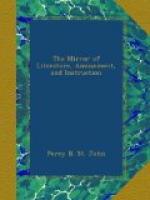“Between the statues, Obelisks
were placed:
And the learned walls with hieroglyphics
grac’d.
Pope.
In after ages they were used to immortalize the actions of heroes, and the memory of persons beloved.
[7] One is stated to be on its
way to England; our parliament
has voted 10,000_l_ to defray the expense.
The other needle is
destined for France.
The first obelisk we know of was that raised by Rameses, King of Egypt, in the time of the Trojan war. Augustus erected an obelisk at Rome, in the Campus Martius, which served to mark the hours on an horizontal dial, drawn on the pavement. This obelisk was brought from Egypt, and was said to have been formed by Sesostris, near a thousand years before Christ. It was used by Manlius for the same purpose for which it was originally destined, namely, to measure the height of the sun.
P.T.W.
* * * * *
THE DYING MAIDEN’S PARDON TO HER FAITHLESS LOVER.
FROM THE FRENCH.
(For the Mirror.)
If death’s keen anguish thou would’st
charm
Ere speeds his fatal dart,
Come, place thine hand—while
yet ’tis warm,
Upon my breaking heart.
And though remorse—thou may’st
not feel
When its last throb is o’er,
Thou’lt say—“that
heart which lov’d so well,
Shall passion feel no more.”
E’en love for thee forsakes my soul—
Thy work, relentless see,
Near as I am life’s destin’d
gaol,
I’m frozen—less
than thee.
Yet take this heart—I ne’er
had more
To give thee in thy need:
Search well—for at its inmost
core,
Thy pardon thou may’st
read.
T.R.P.
* * * * *
ANECDOTE GALLERY.
* * * * *
TRAITS OF IRISH CHARACTER.
(For the Mirror.)
A gentleman residing in the vicinity of Dublin, found, notwithstanding the protection of a thick, and thorny hedge, that great depredations were committed on his garden and paddocks; so he inclosed them with a high, strong wall. As he kept cows, and had more milk than was sufficient for his family, he distributed the overplus amongst his poor neighbours. One day, inspecting in person, this distribution, he saw a woman attending with her pails, who, he was tolerably certain did not require such assistance. “You, here! my good friend,” said he, “I thought you kept a cow?”
“Ay, plase yer honour’s honour, and two it was that I once kept, the craters!”
“Once, why don’t you keep them now?”
“Ough! ’tis yeaself must answer that question, for why? the bastes did well enough afore your rav’rence run up that bit o’ wall round your fields, seein’ the cows lived off your grass; but sorra for me now, I’ve sold ’em both, by rason I couldn’t keep ’em no longer.”




